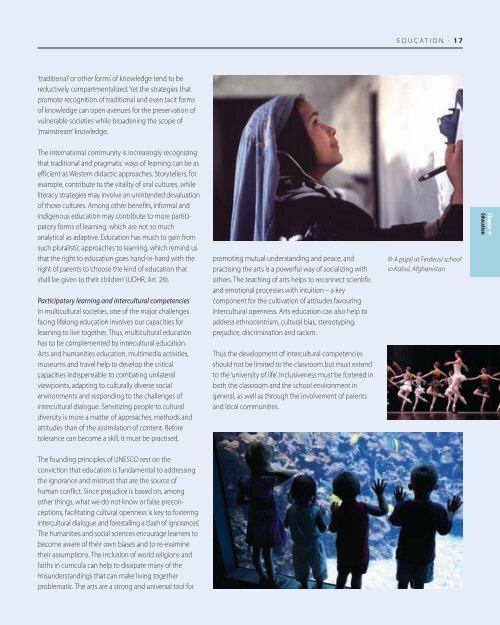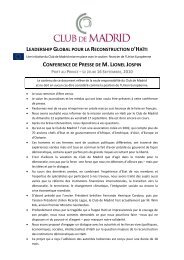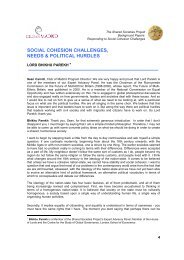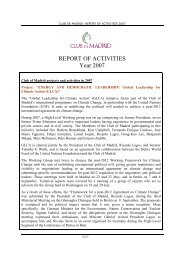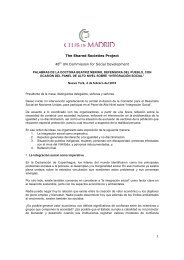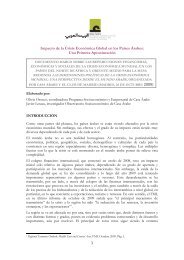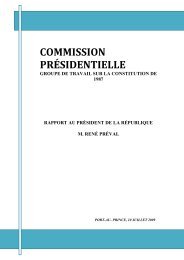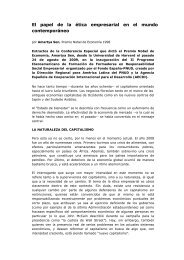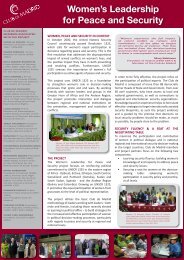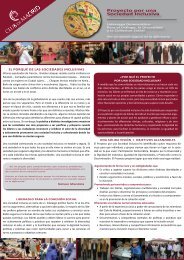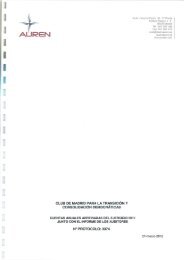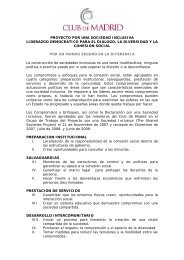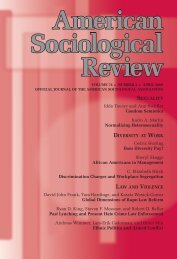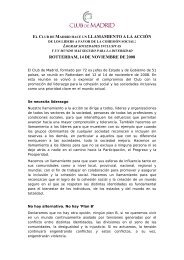Investing cultural diversity and intercultural dialogue - Business and ...
Investing cultural diversity and intercultural dialogue - Business and ...
Investing cultural diversity and intercultural dialogue - Business and ...
You also want an ePaper? Increase the reach of your titles
YUMPU automatically turns print PDFs into web optimized ePapers that Google loves.
EDUCATION . 17<br />
‘traditional’ or other forms of knowledge tend to be<br />
reductively compartmentalized. Yet the strategies that<br />
promote recognition of traditional <strong>and</strong> even tacit forms<br />
of knowledge can open avenues for the preservation of<br />
vulnerable societies while broadening the scope of<br />
‘mainstream’ knowledge.<br />
The international community is increasingly recognizing<br />
that traditional <strong>and</strong> pragmatic ways of learning can be as<br />
efficient as Western didactic approaches. Storytellers, for<br />
example, contribute to the vitality of oral cultures, while<br />
literacy strategies may involve an unintended devaluation<br />
of those cultures. Among other benefits, informal <strong>and</strong><br />
indigenous education may contribute to more partici -<br />
patory forms of learning, which are not so much<br />
analytical as adaptive. Education has much to gain from<br />
such pluralistic approaches to learning, which remind us<br />
that the right to education goes h<strong>and</strong>-in-h<strong>and</strong> with the<br />
right of parents to ‘choose the kind of education that<br />
shall be given to their children’ (UDHR, Art. 26).<br />
Participatory learning <strong>and</strong> inter<strong>cultural</strong> competencies<br />
In multi<strong>cultural</strong> societies, one of the major challenges<br />
facing lifelong education involves our capacities for<br />
learning to live together. Thus, multi<strong>cultural</strong> education<br />
has to be complemented by inter<strong>cultural</strong> education.<br />
Arts <strong>and</strong> humanities education, multimedia activities,<br />
museums <strong>and</strong> travel help to develop the critical<br />
capacities indispensable to combating unilateral<br />
viewpoints, adapting to <strong>cultural</strong>ly diverse social<br />
environments <strong>and</strong> responding to the challenges of<br />
inter<strong>cultural</strong> <strong>dialogue</strong>. Sensitizing people to <strong>cultural</strong><br />
<strong>diversity</strong> is more a matter of approaches, methods <strong>and</strong><br />
attitudes than of the assimilation of content. Before<br />
tolerance can become a skill, it must be practised.<br />
promoting mutual underst<strong>and</strong>ing <strong>and</strong> peace, <strong>and</strong><br />
practising the arts is a powerful way of socializing with<br />
others. The teaching of arts helps to reconnect scientific<br />
<strong>and</strong> emotional processes with intuition – a key<br />
component for the cultivation of attitudes favouring<br />
inter<strong>cultural</strong> openness. Arts education can also help to<br />
address ethnocentrism, <strong>cultural</strong> bias, stereotyping,<br />
prejudice, discrimination <strong>and</strong> racism.<br />
Thus the development of inter<strong>cultural</strong> competencies<br />
should not be limited to the classroom but must extend<br />
to the ‘university of life’. Inclusiveness must be fostered in<br />
both the classroom <strong>and</strong> the school environment in<br />
general, as well as through the involvement of parents<br />
<strong>and</strong> local communities.<br />
L A pupil at Ferdeusi school<br />
in Kabul, Afghanistan<br />
Chapter 4:<br />
Education<br />
The founding principles of UNESCO rest on the<br />
conviction that education is fundamental to addressing<br />
the ignorance <strong>and</strong> mistrust that are the source of<br />
human conflict. Since prejudice is based on, among<br />
other things, what we do not know or false precon -<br />
ceptions, facilitating <strong>cultural</strong> openness is key to fostering<br />
inter<strong>cultural</strong> <strong>dialogue</strong> <strong>and</strong> forestalling a ‘clash of ignorances’.<br />
The humanities <strong>and</strong> social sciences encourage learners to<br />
become aware of their own biases <strong>and</strong> to re-examine<br />
their assumptions. The inclusion of world religions <strong>and</strong><br />
faiths in curricula can help to dissipate many of the<br />
misunderst<strong>and</strong>ings that can make living together<br />
problematic. The arts are a strong <strong>and</strong> universal tool for


